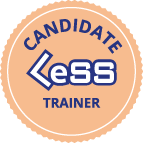What if we could teach people about LeSS using a video game?
We are developing Ikiz, a “sandbox video game” where animated product developer avatars interact with each other and with development artifacts, in a simulated office space.
The game shows how events such as multi-team backlog refinement and sprint planning look to a “fly on the wall”, and makes visible things that are normally invisible such as:
* teams gradually acquiring new skills and knowledge as they work in unfamiliar areas
* hand-offs and work in process
* different ways of choosing to encounter dependencies.
This in turn opens up space for exploration of the impact of structural choices, such as whether to do Backlog Refinement with all team members present or with team representatives; or whether teams sometimes take backlog items they are less qualified for, versus items always being worked on by the most suitable teams.
https://en.wikipedia.org/wiki/Sandbox_game
İkiz is the Turkish word for “twin”, in this case a digital twin. See https://en.wikipedia.org/wiki/Digital_twin
Motivation
LeSS is difficult to understand. Typically it takes many hours of guided study in a LeSS practitioner class, or days of hands-on group work on a LeSS in Action course, to start understanding LeSS. Even after this, students are often left unable to describe practices such as how a LeSS sprint planning works, or how a multi-team PBR is effective at preparing items to be worked on during a forthcoming sprint. Although students have achieved degree of orientation towards LeSS, deeper experience is needed before they feel comfortable with how certain core practices work, and before they are competent to explain and guide those who have not yet attended a training.
An important topic of inquiry among LeSS trainers is how to close this gap in understanding.
Successful LeSS adoptions use ongoing coaching, with a group that is already oriented towards learning and experimenting, and following LeSS rules and guides to support experiments. This is a long process (experiments take several sprints), and needs expert guidance.
Most LeSS training features system modeling, and students are encouraged to introduce this practice within their organisations. But this is also a skill this requires time and practice to use well.
It would be great to have new ways to help close this gap in understanding, to support learning system modeling, and to provide concrete examples of how LeSS events work that can be shared with others.
Audience
This conference session has two audiences
First, people who are at the beginner level of LeSS, who will experience a new way to learn how some aspects of LeSS works in practice. Maybe they will understand better how LeSS can work in their organisation by seeing it play out in a simulated organisation? Maybe they will be inspired by seeing LeSS in the form of a video game?
Second, people with a deeper understanding of LeSS who want to explore the value of simulation video games to teach LeSS concepts and practices. Maybe it is possible to collaborate with the Ikiz developers, and use this during a LeSS adoption?




